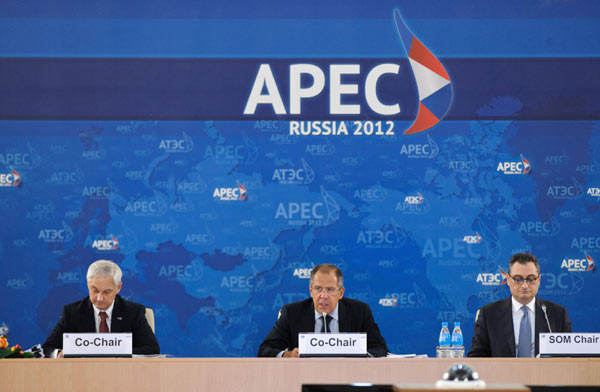APEC observer suggests solution to world economy
 0 Comment(s)
0 Comment(s) Print
Print E-mail Xinhua, September 6, 2012
E-mail Xinhua, September 6, 2012
Governments should be vigilant against a continued sluggish growth worldwide in the next 12 months and seek ways to get out of the trough, an observer of the Asia-Pacific Economic Cooperation (APEC) forum said Wednesday.
 |
|
APEC observer suggests solution to world economy[Photo/Xinhua] |
The global economic slowdown had continued to impact the regional economic integration as well as regional economic growth, the Pacific Economic Cooperation Council (PECC) said in its latest survey released just before an APEC summit over the weekend in Russia's Far Eastern city of Vladivostok.
"Growth in the Asia-Pacific this year is expected to increase slightly to 3.7 percent from last year's 3.5 percent," the State of the Region 2012-2013 Report said.
But PECC Secretary General Eduardo Pedrosa told a press briefing that the expected growth might not be realized due to problems in the euro zone, which weighs heavily on the outlook of the region.
This is because Europe imports around one fifth of the Asia-Pacific region's total exports and European investors hold around one third of the region's financial assets.
Exports from the region to Europe, according to the PECC report, have already dropped in the first half of this year, though not as much as they did in 2009.
The report was based on a survey conducted among 537 people described by PECC as opinion-leaders in the Asia-Pacific region, including government officials, businessmen, scholars and journalists.
As much as 62.4 percent of the respondents did not expect growth in the global economy this year.
Major economies in the region, such as China, Japan and Russia, had more negative expectations than positive forecast. Only the United States had slightly more positive expectations on growth than negative ones for this year.
While the negative expectations for the US growth were 29.8 percent, the positive ones for the country were 30 percent, according to the PECC report.
China, Japan and Russia, on the other hand, had 56.2 percent, 27.4 percent and 29.8 percent on the negative side of expectation respectively. They had 19.4 percent, 19.9 percent and 23.3 percent respectively on the positive side.
According to the survey, regional opinion-leaders worried more about a predicted slowdown in China than they did about the slowdown in Europe and the United States.
It is because China had been a driving force behind the average 8-percent growth from 2009 to 2011 among emerging economies in Asia Pacific, which had contributed to two thirds of the region's total growth during the same period.
Pedrosa said at the press briefing held on the sidelines of the ongoing 2012 APEC forum that a free trade area for the Asia-Pacific might serve as a pathway toward getting out of the current trough of the global and regional slowdowns.
PECC, which has been observing APEC since 2007, pointed out that growth-oriented priorities include regional economic integration, regional response toward the eurozone crisis, and regional growth strategy.
Founded in 1980, PECC is a non-profit international organization committed to the promotion of cooperation and dialogue in the Asia-Pacific region.
As the only non-governmental official observer of APEC, PECC provides independent report "State of the Region" on major regional developments annually.






Go to Forum >>0 Comment(s)